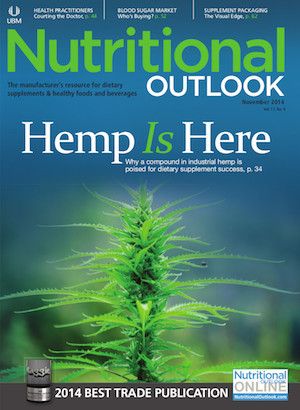Doctors and Dietary Supplements: Using, Recommending, Selling
The relationship between practitioners and the dietary supplement industry grows stronger.

Between one-half and three-quarters of all adults in the United States report taking dietary supplements. And while nearly half of consumers (48%) purchase their supplements from well-known retail outlets, according to a report published in 2011 by dietary supplement association the Council for Responsible Nutrition (CRN; Washington, DC), more than half of them (55%) point to their medical doctor or physician as being their number-one most-trusted source of reliable information on dietary supplements.
With so many consumers looking to their practitioners for guidance on supplements, it doesn’t require a huge leap of imagination to consider that practitioners are positioned to significantly influence the fortunes of the supplement industry by recommending-or not recommending-particular supplements to their patients, and even dispensing supplements themselves.
In fact, that is exactly what is happening, with more practitioners expected to recommend, and especially sell, supplements to patients in the near future. Erik Goldman, editor of Holistic Primary Care: News for Health & Healing, which sponsored the Health Practitioner Marketing Forum this past April, confirms: “There are a lot more practitioners using supplements, recommending supplements, and in some cases dispensing supplements in their offices” now than there were just a few years ago. Goldman recently surveyed U.S. practitioners about their practices and their use of what has been historically viewed as “alternative medicine” and found that an eye-popping 91% of the 643 respondents (who included primary-care physicians, nurses, naturopathic doctors, and others) are currently recommending supplements, nutraceuticals, or natural products to their patients. A full 95% of the MDs surveyed (mainly in general practice) are doing so. What’s more, 45% of respondents are considering dispensing supplements and natural products out of their offices directly to patients via dispensary or an online service.
This data all bodes very, very well for the supplement industry and those who produce the raw materials for it, despite some ongoing challenges-in particular, heavy competition from drugs and a still-evolving body of definitive science.
Building a Relationship
Primary-care physicians (particularly those caring for mothers and older female patients), nurses, and some specialists (mainly cardiologists, orthopedic doctors, and dermatologists) are recommending supplements and talking openly with patients about them, which reflects a “slow, steady paradigm shift” that is predicted to continue, according to Duffy MacKay, senior vice president, scientific and regulatory affairs, CRN. Indeed, 57% of cardiologists, 75% of dermatologists, and 73% of orthopedists reported actually taking supplements themselves, at least occasionally, in a 2011 study conducted by Ipsos Public Affairs for CRN and published in Nutrition Journal. That personal interest in wellness and prevention, particularly among practitioners who are part of the Baby Boomer generation, plays a part in the good relationship between them and industry, says David Foreman, RPH, ND, a retired pharmacist who created and maintains The Herbal Pharmacist blog. Holistic Primary Care editor Goldman agrees, adding that although most of these Baby Boom–era doctors were trained in a “very orthodox, traditional way,” culturally, nutrition science, supplementation, and prevention have been in play for much of their lifetimes. The Boomers tend to believe in proper nutrition for good health, as well as in certain medical conditions, such as food allergies or gluten sensitivity, that were dismissed as “way out of left field” the generation before, Goldman explains. “There are definitely a lot of mainstream doctors who don’t think there is anything radical or alternative about recommending a fish oil or a probiotic at this point,” he says.
Also playing a large and growing role in the generally positive relationship between practitioners and industry is the former’s interest in seeking out new revenue streams. Foreman, Goldman, and Douglas Laboratories’ Gene Adamski, whose company sells supplements to practitioners to sell to their own patients, all cite this factor.
“More and more practitioners are actively coming to us wanting to explore supplementation in their practices,” Adamski says. “The landscape is changing in terms of how practitioners are being reimbursed,” he explains, which has resulted in some dissatisfaction among private-practice owners who feel their net income is suffering. Simply put, health insurance reimbursement is decreasing, while medical office overhead is increasing.
“Private-practice doctors are at a crossroads,” Goldman states, “where they are saying, ‘Yes, I want to stay independent despite declining insurance-company reimbursement, in which case I may have to shift my practice model.’” These shifts, he says, can take the form of simply adding supplement sales and other new sources of revenue to the practice, or they can mean leaving insurance networks altogether in favor of going cash-pay only or adopting a concierge structure, in which patients pay a practitioner annually and subscribe to his or her services. Goldman’s survey reveals that 47%-nearly half-of practitioners surveyed are “considering making a major change to their practice model within the next two to three years,” while 53% are “actively seeking new revenue streams”-such as supplement sales.
On the other hand, practitioners who do not own their own practices but instead belong to large hospital or clinic networks are generally not free to seek additional revenue streams or even to make supplement recommendations that haven’t been explicitly sanctioned by the hospital leadership, so the connection to industry among that group is less solid and much slower-growing.
Another population that is increasingly likely to recommend nutritional supplements to patients, however, is nursing professionals. Nurses and nurse practitioners “spend a lot of time with their patients, and they spend a lot of time on counseling on lifestyle and diet,” CRN’s MacKay explains. The Herbal Pharmacist’s Foreman agrees with MacKay on this point, adding that the majority of nursing professionals are women, and, nationwide, women purchase and consume more nutritional supplements than men do.
Practitioner Picks
Just which supplements practitioners are recommending and even selling to patients most is clear-cut; consensus emerged among all those interviewed for this article. Probiotics, minerals (such as iron and calcium), essential fatty acids (such as omega-3s), and letter vitamins (such as D) lead the pack, followed by multivitamins, specialty supplements (such as coenzyme Q10, recommended mostly by cardiologists, and SAM-e and chromium), and supplemental fiber. Cranberry extract is recommended quite freely and confidently by those in family practice, CRN’s MacKay adds, and he expects an uptick in practitioner recommendations of iodine supplementation to pregnant patients, based on findings laid out in a position paper published this summer by the Academy of Pediatrics about the element’s potential effect on a fetus’s cognitive development.
Recommendations and sales of vitamin D, which has enjoyed enormous name recognition and popularity in recent years, might soon “plateau,” MacKay says, based on a recent U.S. Preventative Services Task Force recommendation that physicians discontinue widespread vitamin D screening. The task force “believes doctors should use a little more judgment to determine who is at risk for deficiency,” MacKay explains, “and that only those individuals should be tested. So if clinicians respond to that, then we’ll see a little less testing, but it will stabilize similarly to how calcium has stabilized: popular forever, necessary, important. But I don’t think we will see that continued upward growth and interest.”
Trailing farther behind the widely recognized and relatively well-regarded big-name supplements are enzymes (though this category is growing), so-called medicinal foods, homeopathics, and medicinal mushrooms.
The health reasons for which practitioners are currently most likely to recommend supplements to patients, according to Douglas Laboratories’ Adamski, include cardiovascular support, autoimmune support, weight loss, stress relief, vitamin deficiency based on blood work, hormone support, inflammation, and general wellness. On the horizon, he adds, will be recommendations for products geared toward women’s hormones and adrenal fatigue, and The Herbal Pharmacist’s Foreman predicts increasing interest in products for blood sugar and antiaging support.
The How-To of Dispensing and Selling Supplements
In Goldman’s survey, about two-thirds of practitioners are seeking new revenue streams for their practices; of these, half are considering dispensing supplements as a way of generating more revenue. The two major methods by which practitioners dispense and sell are 1) by contracting with a supplement manufacturer that operates a practitioner-only sales channel, such as Douglas Laboratories, and 2) by joining and using an online platform, such as PureRxO and Natural Partners, which allows practitioners to order various products and brands from one virtual location or to set up individual websites and maintain virtual stock for patients.
For in-office dispensing, Adamski says, depending on the practitioner’s specialty, if any, and how integrative his or her practice is, a practitioner might carry and stock anywhere from 10 to 100 different products. “We have smaller accounts that order from us twice per year,” he explains, “and larger accounts ordering product every day.” Once a practitioner has contracted with Douglas Laboratories, Adamski says, the company offers “patient-fulfillment programs for which the patient can call Douglas directly, or go online.” In that model, product is shipped directly to the patient on behalf of the practitioner, and the practitioner gets a cut of the sale.
For the online arrangement, the Web platform makes various supplement brands and products available, and in some cases (as with PureRxO) the practitioner sets up his or her own website on that platform. The practitioner specifies which products are “stocked” on his or her site, and patients can shop there. The practitioner takes a percentage of sales.
Connecting with Practitioners
Supplement manufacturers would be wise to strategically educate, and market themselves to, practitioners who recommend or dispense supplements to patients. As Holistic Primary Care’s Goldman puts it, “74% of the practitioners we surveyed recommend at least one specific brand of supplement to their patients. But that also means that 26% are not recommending specific brands, so there is definitely brand effort that needs to happen in this space.”
The Herbal Pharmacist’s Foreman believes that most practitioners are going to keep their distance from brands that are generally available to the public via major retail outlets such as Whole Foods or GNC. “Practitioners are most likely going to want to recommend or dispense a brand that the patient can’t get from a major retailer. They want the patients coming to them for it,” he says, which would suggest the direct-to-physician sales channel might be the most successful route for supplement makers.
MacKay adds that some of CRN’s member companies are already “very focused on” working with practitioners. These companies make “significant efforts to be at the medical conferences, using those as opportunities to educate at the appropriate sponsoring sessions.” And at these events, all practitioners-those practicing integrative medicine and those more mainstream-are targeted. Industry trade shows, he continues, represent “a tougher space, because you are competing with the drug industry for those practitioners’ attention.” In general, MacKay advises, supplement manufacturers need to maintain a “consistent, sustained presence, supporting continuing education where appropriate.”
This presence, however, will cost you. “Whether you sponsor a symposium at the American Heart Association, or you buy a booth at American Family Practitioners, it will be expensive,” MacKay warns. “Certain forms of continuing education that you are doing legitimately, that are CME (continuing medical education) approved, can be very costly and are completely stripped of any commercial benefit. If you are Company A, and you fund a continuing education program on calcium and vitamin D, for instance, none of that benefit comes specifically back to your company. It’s all done in the goodwill of everybody who sells calcium and vitamin D. That’s challenging,” he explains, “because it’s very different from the pharmaceutical model. On the drug side, if you do continuing education for hepatitis C treatments, for instance, you are going to see the benefit back to your company directly, if you have a drug in that space.”
Douglas Laboratories’ Adamski, who oversees a highly educated sales staff, emphasizes the importance of building relationships with practitioners. His team’s “number-one job every day,” he says, “is calling on healthcare practitioners, building the relationship, and educating those practitioners on the science of nutrition and what our company has to offer.”
Near-Perfect Timing
Many factors are converging that point to a continued upward tick of practitioner recommendations and sales of nutritional supplements to their patients: a glut of Baby Boomer practitioners with personal interests in wellness, preventive medicine, and nutrition; owners of private practices seeking out new revenue streams; consumers and patients who view their physicians as trusted sources of dietary supplement information; and a general, gradual cultural shift toward acceptance of some forms of “alternative” medicine-rendering them more mainstream than alternative. With some fairly rigorous-and likely expensive-targeted marketing and education efforts, supplement manufacturers and their suppliers can make headway into the growing practitioner market. The next frontier at which to arrive within this market, says Holistic Primary Care’s Goldman, is “getting buy-in from the hospitals and the insurance companies. When these entities aren’t reimbursing for [supplements] and people have to pay out of pocket for it, that does limit the market’s growth.” He adds, “We are far away from the point where insurance companies are going to reimburse, and hospitals have been very, very conservative in this area. These two places are where energy needs to be focused.”
Holistic Primary Care’s 2014 Survey Report is available for purchase at www.holisticprimarycare.net.
Sidebar: Training Practitioners in Integrative Medicine
Medical education that includes training in integrative medicine, holistic medicine, complementary medicine, or naturopathy produces practitioners who have a relatively strong knowledge of the role of nutritional supplements in wellness and preventive medicine. U.S. medical schools that include such programs include the following:
- University of Maryland. The Center for Integrative Medicine (CIM) at University of Maryland was founded in 1991. Students and faculty at the center conduct research and provide patient care, and education and training in integrative medicine is offered. CIM is a National Institutes of Health Center of Excellence for research in complementary medicine.
- University of Arizona.The Arizona Center for Integrative Medicine at the University of Arizona College of Medicine “creates, educates, and actively supports a community that embodies the philosophy and practice of healing-oriented medicine, addressing mind, body, and spirit,” according to information on its website. Founded in 1994 by Andrew Weil, MD, the well-known medical doctor, naturopath, teacher, and writer, the center focuses its efforts in the areas of education, clinical care, and research.
- Johns Hopkins University.The Johns Hopkins Integrative Medicine & Digestive Center is part of The Johns Hopkins University School of Medicine, Division of Gastroenterology & Hepatology. The clinical care–focused center’s team of practitioners include board-certified physicians, licensed massage therapists, acupuncturists, psychotherapists, and nutritionists who work with patients and their other healthcare providers to address a variety of chronic conditions using an individualized approach.
- University of Michigan.University of Michigan Integrative Medicine (UMIM) consists of patient-care services, including the Integrative Family Medicine Clinic; research; and education. Originally supported by a five-year grant from the National Institutes of Health, UMIM piloted its first Complementary and Alternative Medicine (CAM) courses for medical students in 2000. A unique feature of the CAM course sequence, according to information provided on UMIM’s website, is that it is longitudinal, extending across the entire four-year medical school curriculum.
- George Washington University.The GW Center for Integrative Medicine was founded in 1997 by John Pan, MD, a 1970 graduate of the George Washington University Medical School. Within the GW Medical Center, the Center for Integrative Medicine plays a central role in providing educational programs in integrative medicine, and a fellowship-training program is offered at the graduate level. The clinic combines conventional and evidence-based complementary and alternative modalities to address conditions ranging from dementias and Parkinson’s to autoimmune conditions and mental health issues.
As more major medical schools follow suit and create integrative-medicine departments and clinics of their own, the youngest generation of practitioners are increasingly likely to include such complementary modalities as supplement recommendation into their practices. The key to keeping this integrative-medicine training growing, says Holistic Primary Care editor Erik Goldman, is for these schools to maintain and grow the funding they need to run legitimate programs.
Sidebar: Do Practitioners Understand Supplements?
Part of forging a stronger bond with practitioners means understanding what practitioners know about dietary supplements and the industry in the first place. This summer, on behalf of krill oil ingredients supplier Aker BioMarine Antarctic US (Issaquah, WA), Holistic Primary Care: News for Health & Healing surveyed physicians, nurses, and ancillary healthcare professionals on their involvement with dietary supplements. The 362 respondents provided insight on their supplement recommendations and specifically on omega-3 fatty acids, the category of supplements respondents reported recommending most often.
Health Conditions
First and foremost, 82% of practitioners said they recommend omega-3 fatty acids for heart health. By now, many practitioners understand the link between omega-3 fatty acids and a healthy heart. But the survey indicates that practitioners are mindful of other benefits, too: 81% recommend omega-3s for managing inflammation, 80% for cognitive health and mood, 65% for joint health, and 61% for general well being.
Ingredient Sources
Practitioners may understand omega-3s generally, but do they distinguish between common omega-3 sources? While most practitioners (52%) surveyed considered themselves very knowledgeable about fish oils, they ranked themselves less knowledgeable about other omega-3 sources: flaxseed oil (35% of practitioners felt knowledge), krill oil (23%), chia seed oil (17%), and algal oil (11%).
Aker BioMarine points out that, given that nearly one-third of respondents said their knowledge of krill oil is still limited (as is the case concerning all other omega-3 sources outside of fish), it creates “an ideal educational opportunity” for the firm. (Aker adds that 41% of surevey respondents felt “knowledgeable” about krill oil, and says that “clinician knowledge of krill is definitely higher than for algal or chia oil.”)
Obviously, educating practitioners about ingredient distinctions should be a priority.
Product Attributes
Do practitioners consider organic, non-GMO, and sustainability, when recommending specific supplement products? The survey ranked practitioners’ top criteria when recommending an omega-3 product: 74% consider the fatty acid composition (ratio of EPA to DHA, or phospholipid to triglyceride, etc.), followed by organic (56%), non-GMO (55%), ease of compliance (50%), cost (49%), and sustainability (46%). Other factors ranked lower: traceability (24%), vegetarian (15%), and kosher (4%).
On the apparent low concern with traceability, the survey authors state, “This was surprising, given that without clear traceability, it is difficult to substantiate label claims for many of the other criteria on the list.”
Swayed by Negative Media?
It’s no secret that omega-3 sales declined after a July 2013–published Journal of the National Cancer Institute study linked omega-3 plasma levels and risk of prostate cancer. Were practitioners also swayed by this data? Not as much as you’d think.
According to the survey, which was administered mere months after the negative prostate cancer trial made headlines, 68% of respondents said their omega-3 recommendations had not changed in the past 6–12 months; in fact, 29% reported recommending omega-3s more often.
“The findings suggest that practitioner attitudes are not as volatile as consumer attitudes, and their behavior is not as easily swayed by single studies and alarmist headlines as consumer purchasing patterns,” the authors surmise. “Clinicians are used to seeing and hearing negative trials-they are part and parcel of evidence-based medicine, and there are plenty of negative or inconclusive pharma studies. Practitioners take them in stride, put them in broader scientific context, and tend to hold a more measured view in either direction.” They also point out that there is a certain “inherent conservatism in medical thinking” that makes physicians less likely to stop recommending a supplement based on one or two negative trials; however, this conservatism also makes practitioners less likely to recommend a supplement based on just a few positive trials. Simply put, it takes more than just a few studies to convince physicians.
Recommending How?
Another interesting finding is that a large majority of physicians recommend dietary supplements to treat (88%) or prevent (78%) a specific health condition. Law prohibits supplement marketers from making “prevention” or “treatment” product claims. “But the key point here is that many clinicians are utilizing supplements, nutraceuticals, and natural products specifically to prevent and treat diseases, despite regulatory intentions to limit communication between manufacturers and practitioners strictly to ‘healthy function’ terminology,” the authors say.
-By Jennifer Grebow, Editor-in-Chief
Photo © iStockphoto.com/Spiderstock

Prinova acquires Aplinova to further increase its footprint in Latin America
April 7th 2025Prinova has recently announced the acquisition of Brazilian ingredients distributor Aplinova, which is a provider of specialty ingredients for a range of market segments that include food, beverage, supplements, and personal care.




















